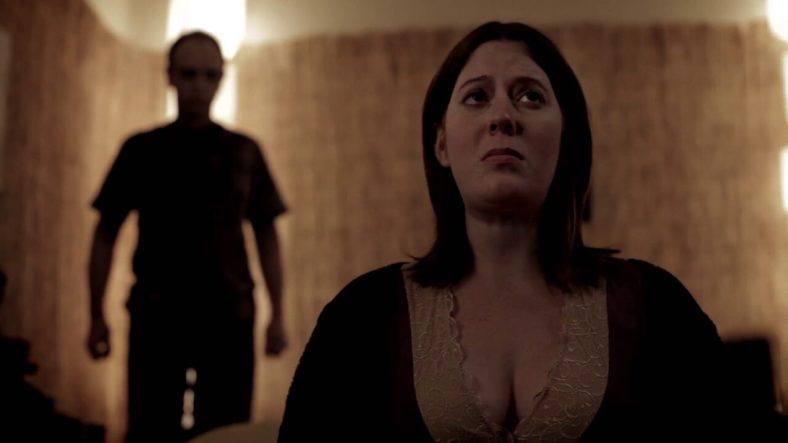I Once Disliked “Absentia.” Now I Love It.

In my early horror days, my daily watches could easily be conceptualized into distinct eras (and my Netflix queue availability). At just 13, I started with the goriest, gnarliest slashers I could find. It was French Extremity all day, every day (I saw a trailer for High Tension in elementary school and had been desperate for it since). After slashers, I transitioned into classics. Freaks, Eyes Without a Face, Onibaba—I was insufferable. I’m sorry to anyone who knew me during that period. Later, my sensibilities shifted toward indie, direct-to-video ghost stories, the kind that had favorable festival premieres, setting the IMDB message boards (RIP) ablaze. I’d anxiously await their arrival on premium rental shelves, eager to explore a burgeoning realm of new horror talents. Ti West’s The Innkeepers, the Vicious Brothers’ Grave Encounters, Nicholas McCarthy’s The Pact, and my favorite, Mike Flanagan’s Absentia.
I used to subsist on trailers, especially indie horror trailers. I loved the atmosphere, the slow delineation of the story. It was thrilling to see which festivals the respective films premiered at (even though it meant nothing to me) and what the critics were saying (and, by virtue of my work here, it’s very cool to be on the other side of that). Absentia’s trailer is a good one. A really good one. In hushed tones and muted visuals, the trailer adroitly sells Absentia’s merging of nascent trauma horror and classic supernatural jolts.
Ain’t It Cool News called it “Powerfully scary.” Fangoria raved it was “one hell of a horror film.” And, Dread Central itself hailed Absentia as “tense and unnerving.” I needed to see it. Desperately. And, to my surprise, the first time I watched it, I didn’t just dislike it—I was outright hostile toward it. It’s a common, though misguided, sentiment in moviegoing circles. The critics duped us all. Powerfully scary? Not at all. Now powerfully dull, that’s an assessment I could get behind.
It would be years before I revisited Absentia. Almost a decade, in fact. During the intermittent period, Mike Flanagan emerged as perhaps my favorite contemporary horror storyteller. It started with a theatrical screening of Oculus. The filmmaking prowess on display was the real deal, and it wasn’t until afterward I recognized it was Flanagan behind the camera. I was used to one-time horror filmmakers. Some kind of festival clout that translates into either obscurity or their own kind of genre absentia. Nick Murphy of 2011’s The Awakening released one additional genre movie, Blood, in 2012, and then shifted exclusively to television.
After Oculus was Before I Wake. It made me cry. A lot. And, to my surprise, it was Mike Flanagan again. Like everyone else, Hush raised my pulse and set my mind ablaze. Then, of course, came The Haunting of Hill House. Five years later, well, the rest is history. Storied, haunted history.
In Absentia, Courtney Bell stars as Tricia, a pregnant woman living alone in Glendale, California. Her husband, Daniel (Morgan Peter Brow) has been missing for years. Tricia prepares to declare him dead in absentia with the help of her therapist, though the arrival of her younger sister, Callie (Katie Parker) throws a wrench into those plans. Occurring alongside Callie’s arrival (though not on account of her), Tricia is plagued by spectral visions and odd occurrences. Callie, too, runs into an always-welcome Doug Jones (The Shape of Water, Ouija: Origin of Evil) in a tunnel. He’s cryptic and frightening, and when Callie returns, he’s nowhere to be seen.
Suffice it to say, something is amiss in the tunnels around Glendale, and the mystery thickens when Daniel returns home, very much alive. Flanagan’s slow yet methodical command of the cryptid-adjacent material—there are missing persons, dark, damp tunnels, and talk of insectoid creatures—was too patient for younger me. I wanted something visceral, something loud and in my face. Instead, I was presented with a deliberately obtuse and at times aloof foray into supernatural terrors.
It wasn’t until years later that I finally came around on Absentia. While it certainly isn’t Flanagan’s strongest, it’s a remarkable debut for one of the genre’s most consistent heavy hitters. If you haven’t had a chance to see it yet, it’s a strong recommendation—and you can even check out what Tyler Doupé had to say about it last year.
In Tyler’s own words, less truly is more. And, more than anything, Absentia is my resonant cry to revisit the classics and hidden gems you didn’t like. There’s no telling why something that doesn’t land suddenly does years later—maybe it’s maturity, maybe changing tastes or exposure—but when it does, there are few feelings quite as incredible. With Flanagan’s The Fall of the House of Usher now available to stream on Netflix, now is as good a time as any. After all, my appreciation for Flanagan’s debut feature, once lost in absentia, is now reborn.
Categorized:Editorials

